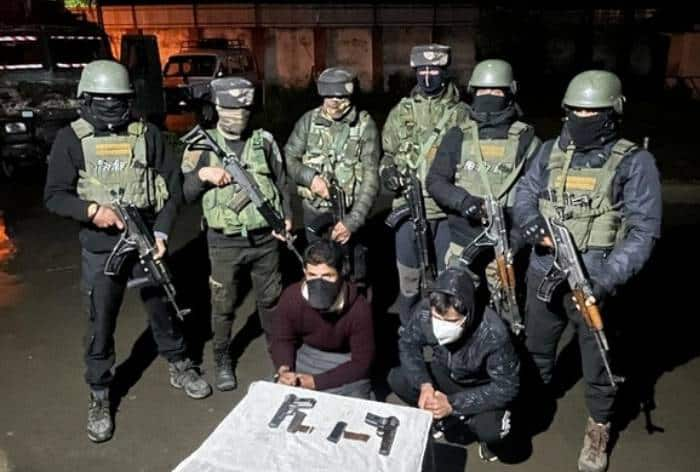Jaish Al Adl: Knows everything about the extremist group in Pakistan against whom Iran launched an attack
Jaish ul-Adl, also known as the 'Army of Justice', is a Sunni Salafist separatist militant organization mainly active in southeastern Iran.
New Delhi: Two bases of the Balochi militant group Jaish al Adl in Pakistan were targeted by missiles on Tuesday, Iranian state media reported, a day after Iran's elite Revolutionary Guards attacked targets in Iraq and Syria with missiles. Pakistan has strongly condemned Iran's violation of its airspace, which resulted in the death of two children and injuries to three girls. Pakistan's Foreign Ministry expressed outrage, calling the act an unprovoked violation of its sovereignty. The ministry states that such a violation is completely unacceptable and could have serious consequences.
Pakistan has lodged a strong protest with the senior Iranian Foreign Ministry official in Tehran. Pakistan's Foreign Ministry has also called on Iran's charge d'affaires to issue its strongest condemnation. Responsibility for the consequences of this violation lies entirely with Iran, the statement said.
Last month, at least 11 Iranian police officers were killed in an attack on a police station in the southeastern province of Sistan-Balochistan, according to Iranian Interior Minister Ahmad Vahidi, who blamed Jaish al-Adl for the incident. He claimed that the Jaish militants entered Sistan from the Pakistani side, near Panjgur.
Who are Jaish al-Adl?
Jaish ul-Adl, also known as the 'Army of Justice', is a Sunni Salafist separatist militant organization mainly active in southeastern Iran. This region is home to a significant population of Sunni Baluchis and shares a porous border with Pakistan. The group has been responsible for numerous attacks on military personnel in Iran, and their main goal is to fight for the independence of Sistan and Baluchistan province, and secure greater rights for the Baluch people. One of the notable aspects of Jaish ul-Adl is its association with Ansar Al-Furqan, another Iranian Sunni Baloch armed group operating in Iran. This alliance strengthens their capabilities and extends their reach, posing a significant challenge to Iranian security forces.
The current leader of Jaish ul-Adl is Salahuddin Farooqui, who took over after his brother, Amir Naroui, was killed by the Taliban in Afghanistan. The rise of Jaish ul-Adl can be attributed to the historical grievances and social problems. economic disparities faced by the Baluch people in Iran. The Baluchis, who are predominantly Sunni in a predominantly Shia country, have long felt marginalized and discriminated against. T
The porous border with Pakistan provides Jaish ul-Adl with a safe haven and facilitates the smuggling of weapons and supplies. This allows them to carry out attacks on Iranian military personnel and infrastructure, making it difficult for the Iranian government to effectively counter their activities. The group's ability to operate in the rugged and remote terrain of southeastern Iran further adds to the challenges facing the security forces.
The Iranian government has been actively involved in efforts to counter the activities of Jaish ul-Adl. They have deployed additional security forces to the region, tightened border security and intensified intelligence operations to disrupt the group's networks. However, the complex nature of the conflict, the porous border and the local support that Jaish ul-Adl enjoys make it a persistent threat. In conclusion, Jaish ul-Adl is a Sunni Salafi separatist militant organization active in southeastern Iran.
Their objectives include fighting for the independence of Sistan and Baluchistan province and securing greater rights for the Baluch people. The group's ties to Ansar Al-Furqan and porous border with Pakistan pose significant challenges to Iranian security forces.
The formation of Jaish al-Adl
Salahuddin Farooqui, a passionate militant, laid the foundation for Jaish al-Adl in 2012. By calling Sistan-Baluchestan and Pakistan their operational bases, the group is gathering support mainly from the ethnic Baluch tribes. This support is increasing in geographic areas where minority Sunni Muslims face discrimination in Shia-ruled Iran.
Attacks, bombings and ambushes
In October 2013, Jaish al-Adl claimed responsibility for killing fourteen Iranian border guards in the city of Saravan. The group claimed the attack was in retaliation for sixteen Iranian Baloch prisoners on death row. The prisoners were convicted of drug trafficking and extremism. As a result of the attack, Iranian officials hanged sixteen prisoners a day later.
Weeks later, in November, two assailants opened fire on Musa Nuri's vehicle in the city of Zabol, Sistan and Balochistan province. The attack killed at least two people, including Nuri, Zabol's prosecutor, and his driver.
Jaish Al-Adl claimed responsibility for the attack, as well as for the hanging of the prisoners days before. Nine days later, militants attacked a Border Guard patrol, killing fourteen guards and wounding six others.
In February 2014, terrorists kidnapped five Iranian border guards in Sistan and Baluchistan and transferred them to Pakistan. One of the hostages was murdered sometime in March 2014, while the other four were released in April 2014. Jaish Al-Adl claimed responsibility for the kidnappings.
In October, Iran's state news agency reported that three members of Iran's security forces had been killed by Jaish ul-Adl. According to the news agency, the militants had called the police emergency line and as soon as the members of the security forces reached the area, they were attacked by Jaish ul-Adl militants.
Earlier, one Iranian soldier was killed and two pro-government militiamen were injured in an attack blamed on Jaish ul-Adl.
Today, January 2024, Iran claimed to have attacked the headquarters of Jaish ul-Adl with ballistic missiles and drones.
Remark: Over the years, the restive province of Balochistan has become a hotbed of terror attacks, and many banned religious terror and separatist groups have also used the area to carry out attacks on Pakistani security personnel and installations.


